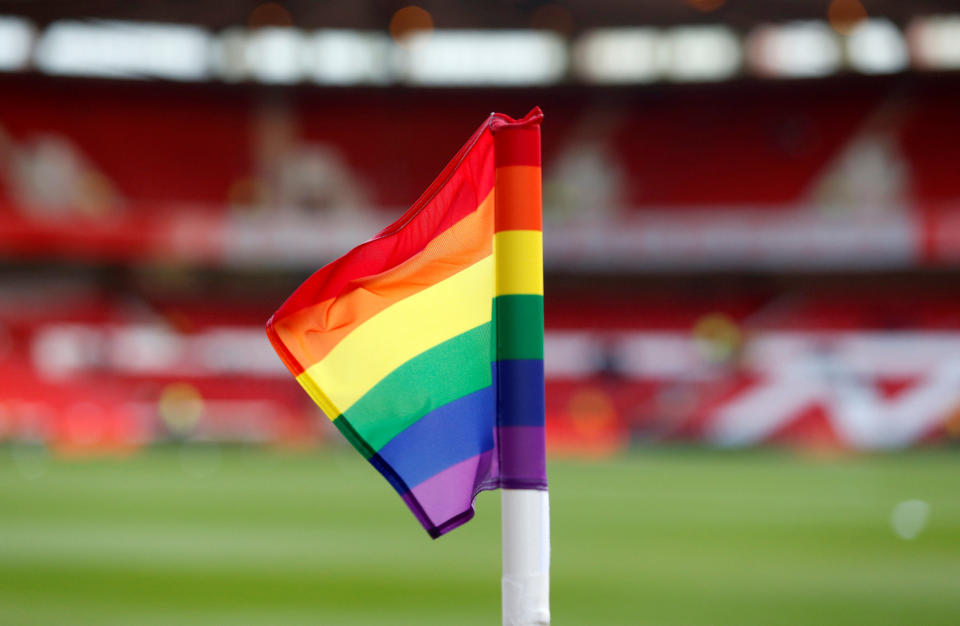Poll of 50,000 fans reveals international attitudes towards LGBT inclusion and homophobic abuse in football

In October 2017, over 50,000 Forza Football users, from 38 countries across 5 continents, responded to questions written by Stonewall and Forza Football – the largest-ever poll of its kind (and a replication of a similar poll by the two organisations in 2014).
Key Findings
Internationally, 76% of fans analysed in the poll would feel comfortable if a player in their national team came out as gay or bisexual.
Football fans in Ireland and Iceland would feel most comfortable (both 87%), and fans in Egypt, Saudi Arabia, and the UAE ––one of the 72 countries worldwide where same-sex relations are criminalised or in the process of being criminalised – would feel the least (10%, 11%, and 13% respectively).
This figure is 80% for British fans, but only 63% for Americans (lower than Mexico – 65% – for example).
47% of Russian fans and 14% of Qataris would feel comfortable with a gay or bisexual player in their national team.
Compared to equivalent data from 2014, Russia has seen the largest increase in tolerance amongst its fans – with 47% of fans feeling comfortable about a gay or bisexual player in the national team in 2017, versus 21% in 2014.
When choosing World Cup hosts, 64% of football fans globally think FIFA should consider LGBTQI rights when deciding the locations for international tournaments.
26% of Russians and 14% of Qataris think this should be a factor in the decision-making process; compared to 77% of Icelanders, 66% of Brits, and 55% of Americans.
Nationalities that are more comfortable compared to 2014 data include Colombia (up from 49% in 2014 to 67% this year), and Greece (43% to 59%). 2014 World Cup hosts Brazil saw the largest decline in tolerance in the last three years, dropping from 67% in 2014 to 60%. Italy, Turkey, and Saudi Arabia were the only other countries to see a decline in levels of comfort (68% to 62%, 48% to 47%, and 12% to 11% respectively).
READ MORE: First openly gay referee Ryan Atkin says Rainbow Laces is a start, but big-name players must do more
Patrik Arnesson, Forza Football CEO and Co-founder, comments: “Though I am proud of this report and our ability to give football fans one collective voice, the results make for unsettling reading. Lesbian, gay, bi and trans people are part of the football community across the world, and have as much right to play, watch and follow the game as much as anyone else. Organisations like FIFA and national leagues and governing bodies have a responsibility to ensure that fans across the world are educated about the importance of welcoming LGBT players and fans, and they must challenge discrimination and abuse at their tournaments. While it is encouraging to see the attitudes of Russian fans improving towards LGBT people in football, there is still such a long way to go. With the biggest sporting event on earth taking place in Russia in 2018, we want to see FIFA taking a stronger stance to ensure the safety of all LGBT fans involved in the tournament.”
Ruth Hunt, Chief Executive of Stonewall, said: ‘What these results reflect is how much work there is still to do before we can say that we live in a world where lesbian, gay, bi and trans people are accepted without exception. In 72 countries same-sex relationships are criminalised and, as this poll shows, where there is anti-LGBT legislation there will inevitably be hostile attitudes. We believe sport has the power to bring people together and create change. For many LGBT people in Russia for example, the World Cup is seen as an opportunity for the daily abuses and discrimination they face to be put under the spotlight; to be questioned and criticised.
‘We know many fans in the UK will be keen to protest the human rights abuses that LGBT people face in Russia and we’ll be working closely with activists based in the country to ensure that whatever action is taken is helpful and effective. We believe the upcoming World Cups are an opportunity to shine a light on what the situation is like for LGBT people in Russia and Qatar and start conversations that can lead to positive change.’
Extended Findings
General
Across all the questions, fans in Iceland, Ireland, and Spain are amongst the most supportive of LGBT inclusion and combatting homophobia in football.
Across all the questions, fans in Middle Eastern countries – including Qatar – are amongst the least supportive of LGBT inclusion and combatting homophobia in football.
Overall globally, fans are more accepting of gay or bi players than they were in 2014 (although there are many who are not): 55% of fans worldwide would accept a national team player coming out as gay in 2017, compared with 46% in 2014.
Feeling comfortable with players coming out
80% of British fans would be comfortable if a member of their national team came out as gay or bisexual; 63% of American fans; 47% of Russian fans; and 14% of Qatari fans.
Icelandic (87%) and Irish (87%) fans are most likely to be comfortable with a national player coming out.
Egyptian (10%) and Saudi (11%) fans are least likely.
A comparison with the 2014 data reveals:
In Russia, this has risen dramatically, from 21% in 2014, to 47% in 2017.
In the USA, this figure has risen from 52% in 2014, to 63% in 2017. In the UK, it has risen from 73% in 2014, to 80% in 2017.
In Brazil (67% in 2014, 60% in 2017) and Saudi Arabia (12% in 2014, 11% in 2017), fans are now less accepting of gay players in their national team than they were three years ago.
Consideration of LGBTQI rights when selecting tournament hosts
66% of British fans feel that FIFA should consider LGBTQI rights when deciding which countries host international tournaments; 55% of American fans; 26% of Russian fans; and 14% of Qatari fans.
Icelandic (77%) and Irish (70%) fans are most likely to feel that LGBTQI rights should be considered in the selection of tournament hosts.
Qatari, Emirati, and Saudi fans (all 14%) are least likely to agree with this.
Educating fans on homophobic abuse
75% of British fans feel that football clubs should be active in educating fans on homophobic abuse; 64% of American fans; 40% of Russian fans; and 29% of Qatari fans.
Spanish (82%) and Portuguese (81%) fans are most likely to think this.
Saudi (23%) and Emirati (27%) fans are least likely.
Supporting LGBTQI campaigns in football
66% of British fans would support an LGBTQI inclusion-in-sport campaign (such as Stonewall’s Rainbow Laces campaign); 51% of American fans; 15% of Russian fans; and 13% of Qatari fans.
Icelandic (77%) and Irish (73%) fans are most likely to support a campaign of this kind.
Saudi (7%) and Egyptian (8%) fans are least likely.
Witnessing homophobia during football matches
42% of British fans have witnessed homophobic abuse during a match; 34% of American fans; 21% of Russian fans; and 36% of Qatari fans.
Spanish (64%) and Albanian (59%) fans are most likely to have witnessed homophobia at games.
Russian and Jordanian fans (both 21%) are least likely.
Reporting homophobia witnessed at football matches
64% of British fans would be comfortable reporting homophobic abuse; 68% of American fans; 47% of Russian fans; and 26% of Qatari fans.
Icelandic (83%) and Spanish (79%) fans are most comfortable reporting homophobic abuse.
Saudi and Qatari fans (both 26%) are least comfortable.
About Stonewall (www.stonewall.org.uk – Registered charity number 1101255)
Stonewall is the leading charity for lesbian, gay, bi and trans equality, working to create a world where every single person can be accepted without exception. It was founded in 1989 by a small group of people who wanted to break down barriers to equality. Stonewall continues to campaign and lobby government to change laws to ensure everyone, everywhere, is free to be themselves. Stonewall works in partnership with a growing network of more than 700 organisations to help create real change for the better. It campaigns to eliminate homophobia, biphobia and transphobia in communities, and empowers LGBT people and their allies to be role models wherever they live, work, shop, socialise or pray.


